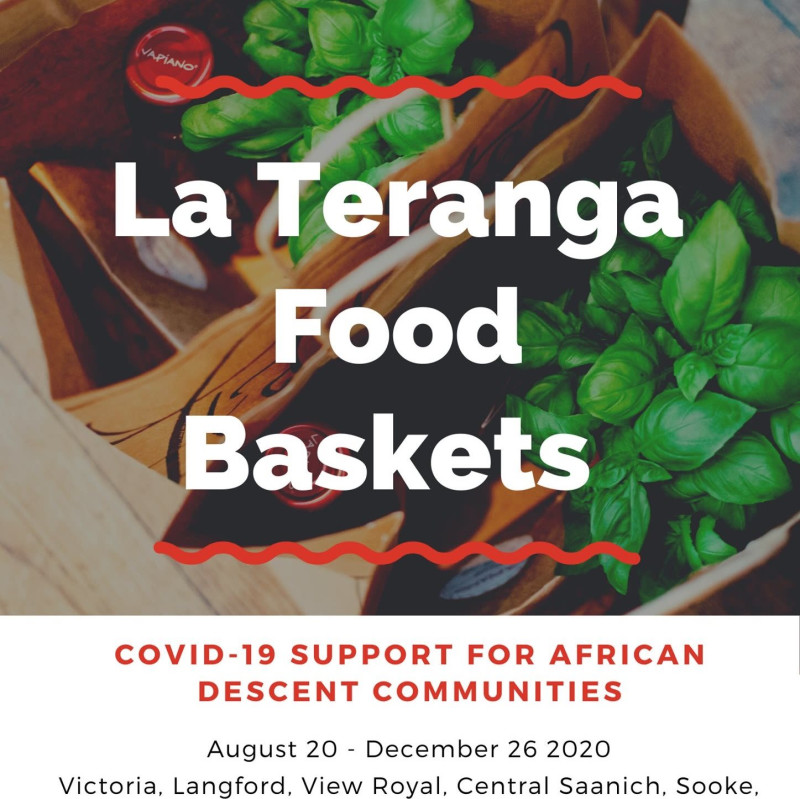When I decided that I wanted to pursue an Honours project for the last year of my program, I thought that it would be an amazing chance to work with a community partner while also completing geographic research in my area of interest. Luckily, there was an opportunity to work with a really exciting non-profit organization, The Issamba Centre, to help them with program evaluation for their newest initiative – the La Teranga Food Basket Program.

Source: https://do250.com/la-teranga
The La Teranga Food Basket program was created amid the disruption of the Covid-19 pandemic in March 2020 by the Issamba Centre, which is a hub for people of African descent in Greater Victoria that was founded in 2012. As stated on the Issamba website, their mission is to “advance awareness and understanding of the richness and diversity of African culture and traditions through the promotion of a broad range of cultural, educational and artistic activities, events and programs.” The Issamba Centre not only aims to create a community centre for the African diaspora in Victoria, it also helps to integrate immigrants into their new home in Canada and ensure that they are supported in their community.
The La Teranga Food Basket program was started by the Issamba Centre when they discovered through discussion with their community that many people in the African diaspora community in Victoria were experiencing cultural food insecurity during the Covid-19 pandemic. The purpose of this program is to provide food baskets of culturally relevant food staples to low-income members of the African diaspora and Black community in Victoria, Saanich, Langford, Duncan, and Nanaimo. Many foods that the African diaspora community normally eat are difficult to find at local grocery stores and food banks, meaning much of the food given out for the La Teranga initiative is sourced from Vancouver and other parts of Canada. The food basket program has seen such significant demand for their services that some families have been denied baskets due to a lack of resources and funding.
Source: https://vaccsociety.blogspot.com/2020/12/la-teranga-food-distribution.html
The main objective during my collaboration with La Teranga has been to help the program managers conduct program evaluation to assess their client’s satisfaction with the food baskets. There are two main reasons for program evaluation: to find out how the La Teranga program can be improved in the future to better serve the needs of the community, and to display program effectiveness to help with applications for funding. The Issamba Centre wanted to collaborate with a student for this project because, since they are a non-profit organization under high demand for their services, they were lacking the human and financial resources to complete program evaluation on their own.
Although I had never actually conducted a program evaluation for a non-profit organization before beginning this project, I thought this would be a great opportunity to learn more about this topic and to help out the Issamba Centre in the process. I have always been very interested in issues of food security, and specifically, issues surrounding immigrants’ access to culturally appropriate food. I am also interested in potentially pursuing a career in the non-profit sector, so this project has provided some very valuable insight into the inner workings of community-based non-profit organizations. The La Teranga project is such an amazing initiative that is directly helping so many people during the Covid-19 crisis, and I am thrilled to be able to contribute my skills to this program.
This project has been difficult in some ways but has also benefitted my learning as a Geography student immensely. When beginning to conduct background research for my thesis, I spent many hours reading about the principles of community-based research methods. Community-based research is grounded in the concepts of reciprocity, mutual respect, and social justice. This method of research strives to co-create knowledge between both researchers and community members, whereby both groups’ knowledge is valued equally. Community-based research also focuses on conducting research that is useful to the community partner. Although these principles are in line with my own intentions as a researcher, I knew that it would be more difficult in some ways, but also more fulfilling, to conduct a community-based project rather than a more traditional research project. Completing a community-engaged project during the Covid-19 pandemic has definitely been challenging, but has also provided some unique opportunities.
Doing community-engaged work with non-profit organizations often has capacity limitations because non-profit program managers are often extremely busy directly helping their community, which can make it difficult to complete projects within the time frame of school courses. These capacity limitations have been exacerbated in some ways by Covid-19. The impacts of Covid-19 have made it somewhat challenging to connect and build meaningful connection with the Issamba Centre; province-wide restrictions have not allowed me to meet with them in person since the beginning of the project or volunteer at the weekly food-basket pick-ups. Without in-person meetings, it has been harder to get feedback from my community partners to ensure that the project is in line with their needs, which is an essential part of community-engaged research.
On the other hand, the impacts of Covid-19 have provided a very different way to engage with the community. Without the Covid-19 pandemic, the La Teranga program would most likely not exist. The difficulties of Covid-19 have provided me with an opportunity to work with a group of people I would probably have not had the chance to work with otherwise. We have had to learn to adapt quickly to the changing times and it has been a both challenging and rewarding experience as a student. Although I can’t actually be out in the field working with community-partners in person, this project has provided a unique opportunity for connection during this time of crisis (via Zoom) and has allowed me to use my skills and knowledge to help people in the real-world!
